Reporting Peace: ASEAN Journalists on the Frontlines of the WPS Agenda
The ASEAN Women, Peace and Security (WPS) Media Award 2025 concluded on a successful note. Out of hundreds of submissions, three journalists were chosen from 30 shortlisted reporters for their outstanding coverage: Elsa Emiria Leba (Indonesia), Ludwig Federigan (the Philippines) and Nguyen Khanh Duong (Viet Nam). As the winners, they had the opportunity to attend and cover the 2025 ASEAN WPS Summit held on 9–10 September 2025 in Kuala Lumpur, Malaysia. During the event, they shared their experiences at the Summit and reflected on the WPS agenda, particularly its implementation in their respective countries and across the region.

Winners of the ASEAN WPS Media Award at the 2025 ASEAN WPS Summit on 9 September 2025 in Kuala Lumpur, Malaysia. From left to right: Elsa Emiria Leba (Indonesia), Ludwig Federigan (Philippines), Nguyen Khanh Duong (Viet Nam). Photo: ASEAN IPR/Anissa Dini
Why They Joined – and the Stories That Won the ASEAN WPS Media Award
Elsa Emiria Leba is currently assigned to the international desk of Kompas Daily in Indonesia, where she has worked since 2017. She joined the ASEAN WPS Media Award after a colleague encouraged her to apply, saying she wanted to see how well her work reflected the WPS agenda. “It was an interesting experience. I got to know 29 journalists across ASEAN, and we were able to exchange stories and learn together about the WPS agenda,” said Elsa.
Her article, entitled “The Story of Women Planting Seeds of Peace in Conflict Lands,” earned her the first prize of the ASEAN WPS Media Award. It recounts the experiences of Indonesian peacekeepers in conflict-affected countries such as Democratic Republic of the Congo, Lebanon, and Syria, and highlights women’s vital role as peacemakers in these missions. “I also reflected on some recent data about the progress of women peacekeepers in Indonesia, whose number is still quite low. There are around 2,500 female troopers deployed worldwide compared to around 20,000 men,” added Elsa.
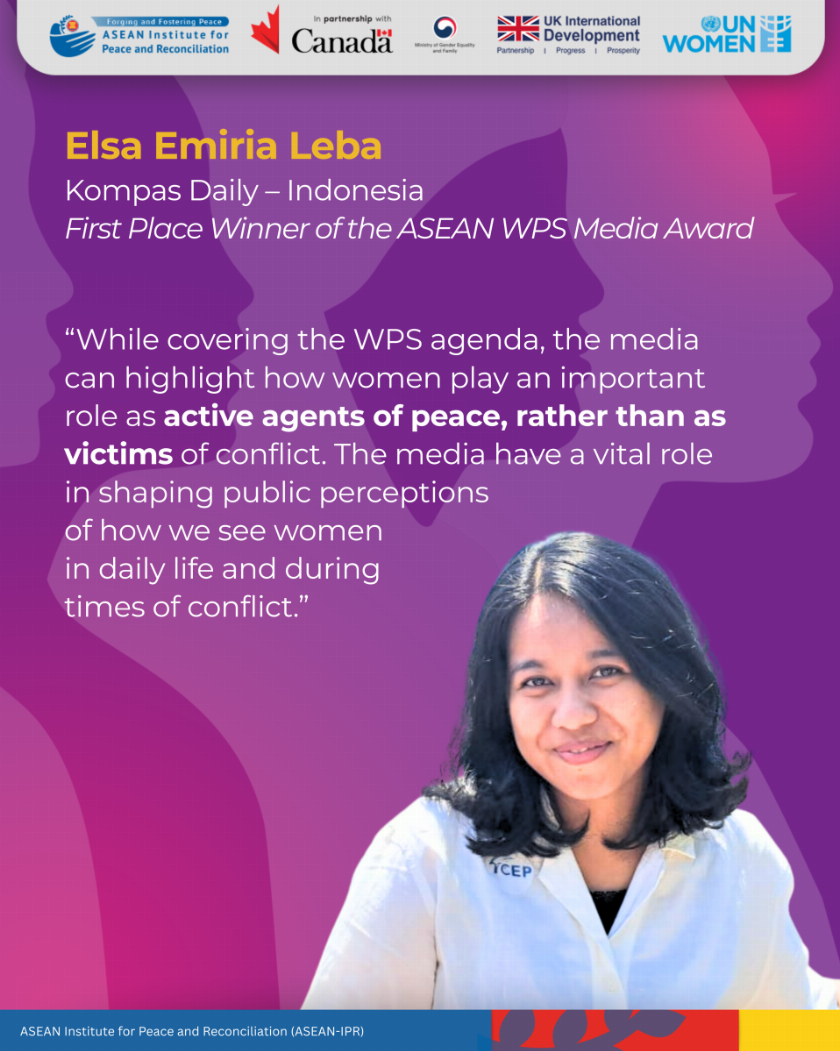
The second-place winner, Ludwig O. Federigan from the Philippines, has been a columnist for The Manila Times for seven years, writing a weekly feature titled “All About Choices,” which focuses on environmental issues, climate change, disaster resilience and sustainability. His submission for the ASEAN WPS Media Award explored the intersection of women, climate and conflict in the Philippine context. It was his first article centred on the WPS agenda.
His article, “Storm Sisters: Filipinas Redefine Climate Peace,” tells the stories of three Filipinas who have experienced the impacts of climate-related conflict in Luzon and Mindanao, most of whom are from the Bangsamoro community. “We know that in the Philippines, being such a climate-vulnerable country, women are among the most affected groups. In particular, Bangsamoro women have less capacity to address climate impacts, having lived through domestic conflict for decades,” he explained.
After the article was published, it was even featured by the International Civil Society Action Network in its weekly #WPSWednesday news roundup during the ASEAN WPS Media Award assessment period.
The third-place winner, Nguyen Khanh Duong, is a journalist at Vietnam News. She has worked in journalism for 10 ten years covering political and social affairs. Over the past year and a half, she has focused on the WPS agenda, after attending a UN Women event in Indonesia. Since then, she has continued to follow Women, Peace and Security developments in Viet Nam and across the region.
When she heard about the ASEAN WPS Media Award, Nguyen felt she had a story worth sharing and decided to apply. “In Viet Nam and in the ASEAN region, there are not many trainings on the WPS agenda. So, it was my first time attending a training and workshop designed specifically for journalists reporting on this topic. That’s why the ASEAN WPS Media Award workshop was so exciting and helpful,” she said.
Her article, “From Victim to Agent of Change: Ethnic Girl Breaks Child Marriage Stereotypes,” tells the story of a Vietnamese ethnic minority girl named Sung Thi So. Once a victim of early marriage, she later dared to raise her voice to challenge stereotypes. Sung Thi So pursued her dream of attending university in a major city in Viet Nam and now runs a project that provides legal support to other girls and women facing similar challenges, including child marriage and related legal issues. “From being a victim, she has now become an agent of change,” said Nguyen.
ASEAN WPS Summit 2025: Highlights and Takeaways
All three winners finally met in person at the 2025 ASEAN WPS Summit. During the event, they had the rare opportunity to interview senior Malaysian officials, including H.E. Dato’ Sri Haji Fadillah bin Haji Yusof, Deputy Prime Minister of Malaysia, and H.E. Dato’ Sri Hajah Nancy Shukri, Minister of Women, Family and Community Development of Malaysia.
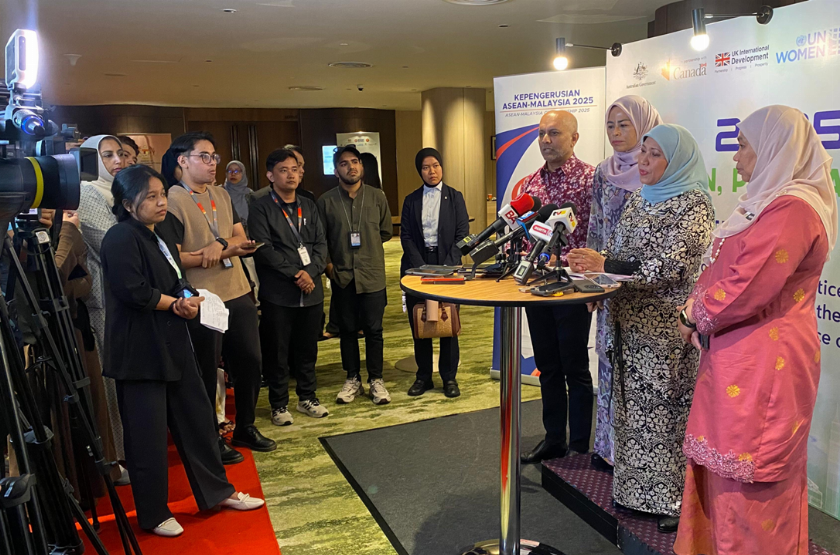
The ASEAN WPS Media Award winners and several other journalists interview the Minister of Women, Family, and Community Development of Malaysia, H.E. Dato’ Sri Hajah Nancy Shukri at the 2025 ASEAN WPS Summit on 9 September 2025 in Kuala Lumpur, Malaysia. Photo: ASEAN IPR/Anissa Dini
Elsa shared that attending the ASEAN WPS Media Award was an enriching experience, as it allowed her to network with experts on the Women, Peace and Security agenda. It also gave her a broader perspective on how the agenda connects with other issues. “It is not only one issue. Other themes also influence how we see women’s role in the peace and security agenda,” she said.
As the first-place winner, Elsa was also invited to speak in a session titled “The Role of Media and Digital Platforms in Advancing the WPS Agenda in ASEAN.” In her remarks, she emphasised that the media plays a key role in shaping how the public perceives and understands issues, including women’s roles in society and in peace and security. “If the media can amplify women’s voices, I believe it will also encourage the public to see women in a more positive and inclusive way. Beyond that, the media is crucial in raising awareness of key issues and in serving as a watchdog over the government,” Elsa remarked.
Ludwig shared that attending the ASEAN WPS Summit was a special experience, one of the few occasions where he found himself in a space dominated by women. However, he noted that numbers are not what matters most, as we all recognise the important role of women in our society. “Regardless of the culture and beliefs among ASEAN nations, women remain a strong force in government, the private sector and civil society. In the Philippines, I have seen many NGOs led by women. They have provided valuable recommendations and insights to the government in addressing societal issues,” said Ludwig.
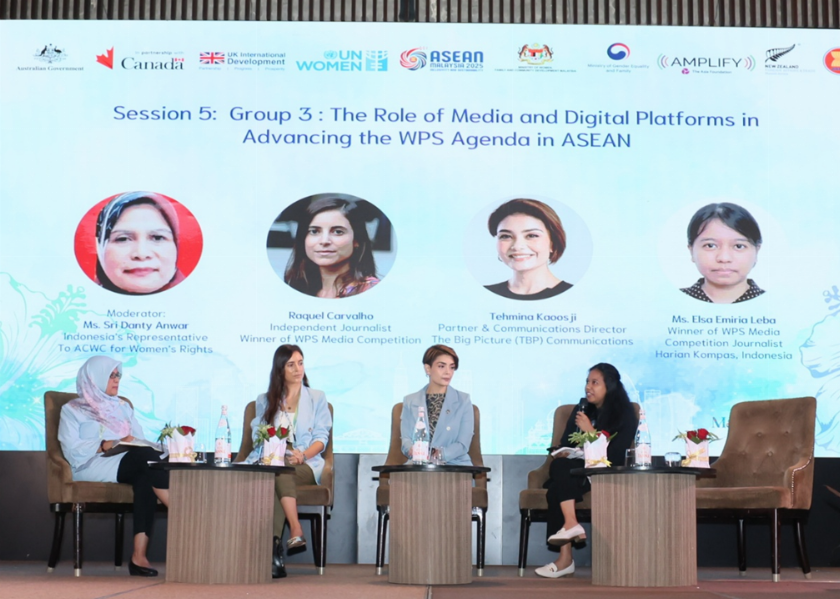
The first-place winner of the ASEAN WPS Media Award, Elsa Emiria Leba, speaks at the session “The Role of Media and Digital Platforms in Advancing the WPS Agenda in ASEAN” during the 2025 ASEAN WPS Summit on 10 September 2025 in Kuala Lumpur, Malaysia. Photo: Summit’s organizer
Nguyen shared the same sentiment, saying she felt honoured to have “a very rare chance for us three journalists to cover a major WPS event in ASEAN.” Her main takeaway from the Summit was that writing the WPS agenda is not only about shaping major policy, but also about beginning to address the needs and initiative of local communities. “We can start from very small things but make a great impact in the region,” said Nguyen.
Looking Ahead: Journalists’ Reflections and Hopes for WPS Reporting
Speaking from a journalist’s perspective, Elsa noted that coverage of the Women, Peace and Security agenda still needs to be expanded across the ASEAN region. Public awareness also remains limited. She recalled the challenges she faced in researching WPS-related stories, which often took considerable time. Elsa hopes that in the future there will be more training opportunities for journalists on the WPS agenda.
“I think it’s important that the media plays a big role in amplifying the WPS agenda. There’s much more we can do in the region, such as through training and other campaigns that highlight WPS issues,” she said.
Elsa also emphasised that the media has a vital role in shaping public perceptions of women, both in everyday life and during times of conflict. “While covering the WPS agenda, the media can highlight how women play an important role as active agents of peace, rather than portraying them as victims of conflict,” she added.
Looking ahead, she hopes that the WPS agenda will be championed not only by female journalists, but also by their male counterparts. “We need to encourage more male journalists, to take part in trainings and campaigns on the WPS agenda,” Elsa concluded.
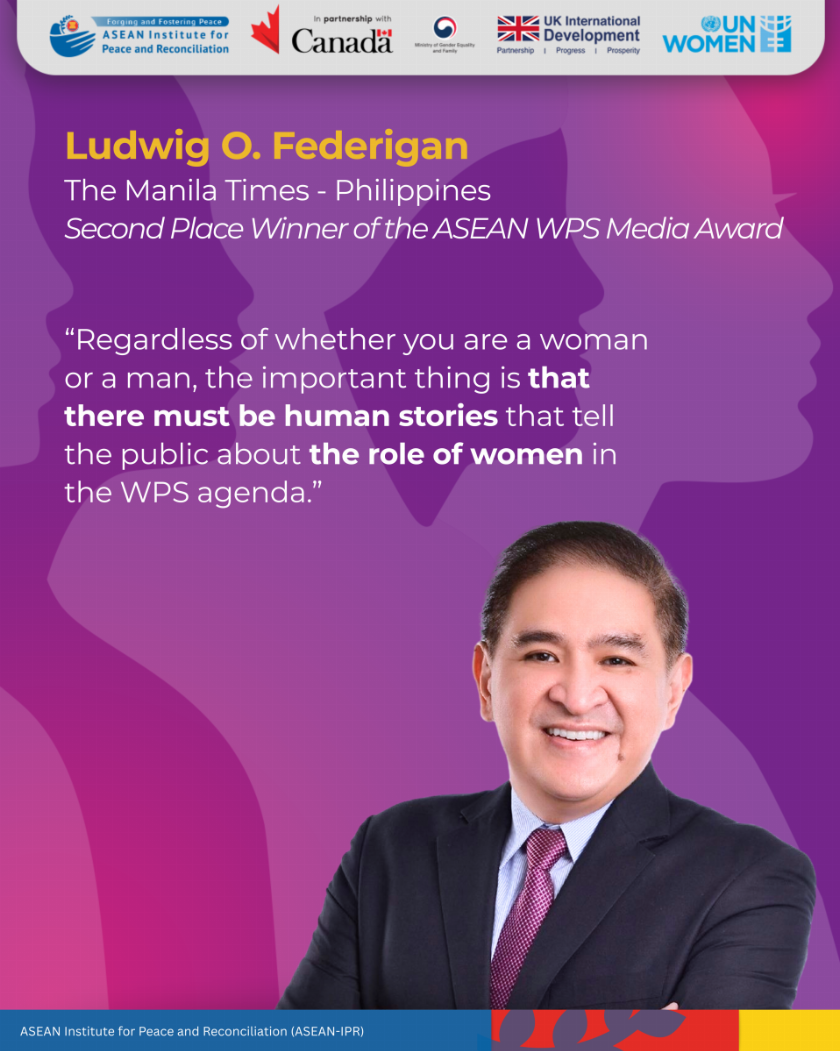
As the only male journalist among the winners, Ludwig shared his perspective and hopes for the WPS agenda, “Women remain an important constituency in addressing societal issues. Therefore, women should take part in planning and decision-making and have a seat at the table,” he said. He also believes that both government and NGOs should continue providing platforms for media practitioners to tell the stories of those advancing the WPS agenda. “Regardless of whether you are a woman or a man, what matters most is telling human stories that show the public the role of women in the WPS agenda,” he added.
Nguyen further explained that the media plays an important role as part of the Community of Practice (CoP), helping to amplify the voices of other stakeholders such as the government, NGOs and academia. “The media can collaborate with these stakeholders in the Community of Practice to strengthen the WPS agenda in the region,” she said.
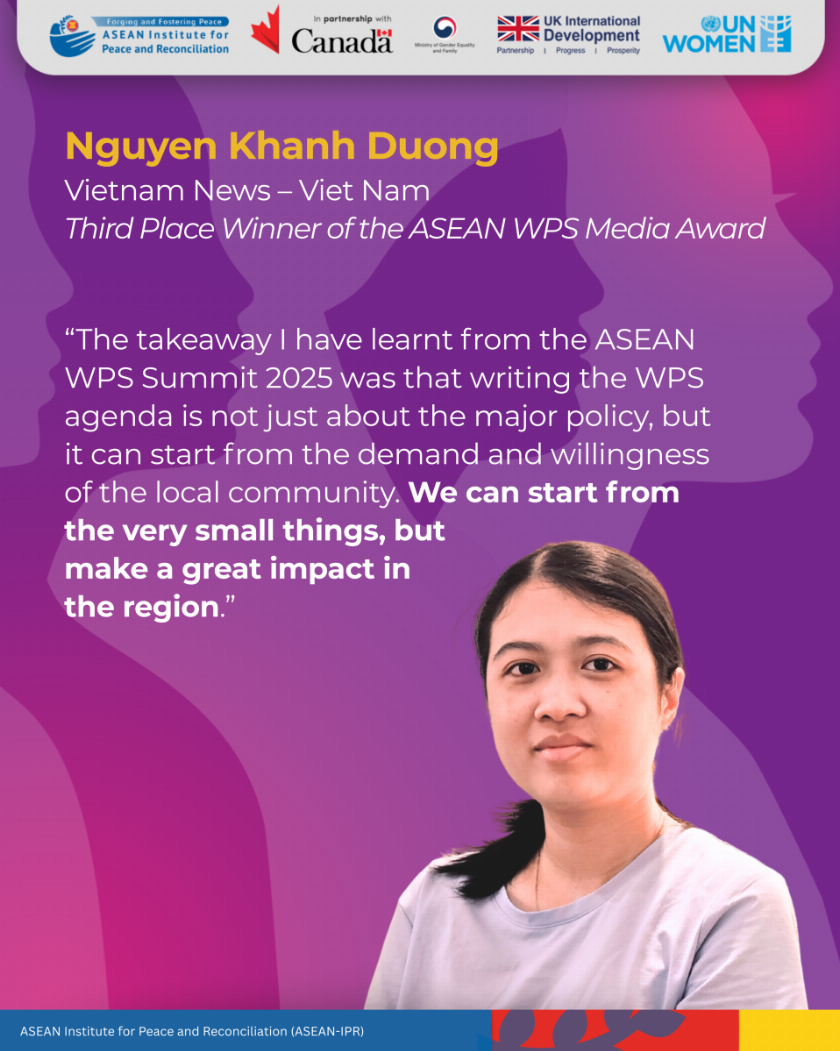
She also expressed hope that in the future more training and opportunities will be available for ASEAN journalists to report on the Women, Peace and Security agenda. “Reporting on WPS sometimes involves sensitive issues, so we really need professional training and the right skills to cover them,” she said. Nguyen added that she hopes journalists will also have more chances to attend and report on high-level events, such as summits and conferences on WPS. “If given these opportunities, the media can play a major role in raising public awareness of WPS issues,” she concluded.
The ASEAN WPS Media Award is part of the initiative to build the ASEAN WPS CoP led by the ASEAN Institute for Peace and Reconciliation (ASEAN-IPR) and UN Women, which recognises journalists as key partners in advancing the Women, Peace and Security agenda. The Award, the workshop for 30 selected journalists and the CoP are components of the ASEAN regional project, “Empowering Women for Sustainable Peace: Preventing Violence and Promoting Social Cohesion in ASEAN,” implemented by ASEAN, in collaboration with UN Women and generously supported by the Governments of Canada, the Republic of Korea and the United Kingdom.
_____




